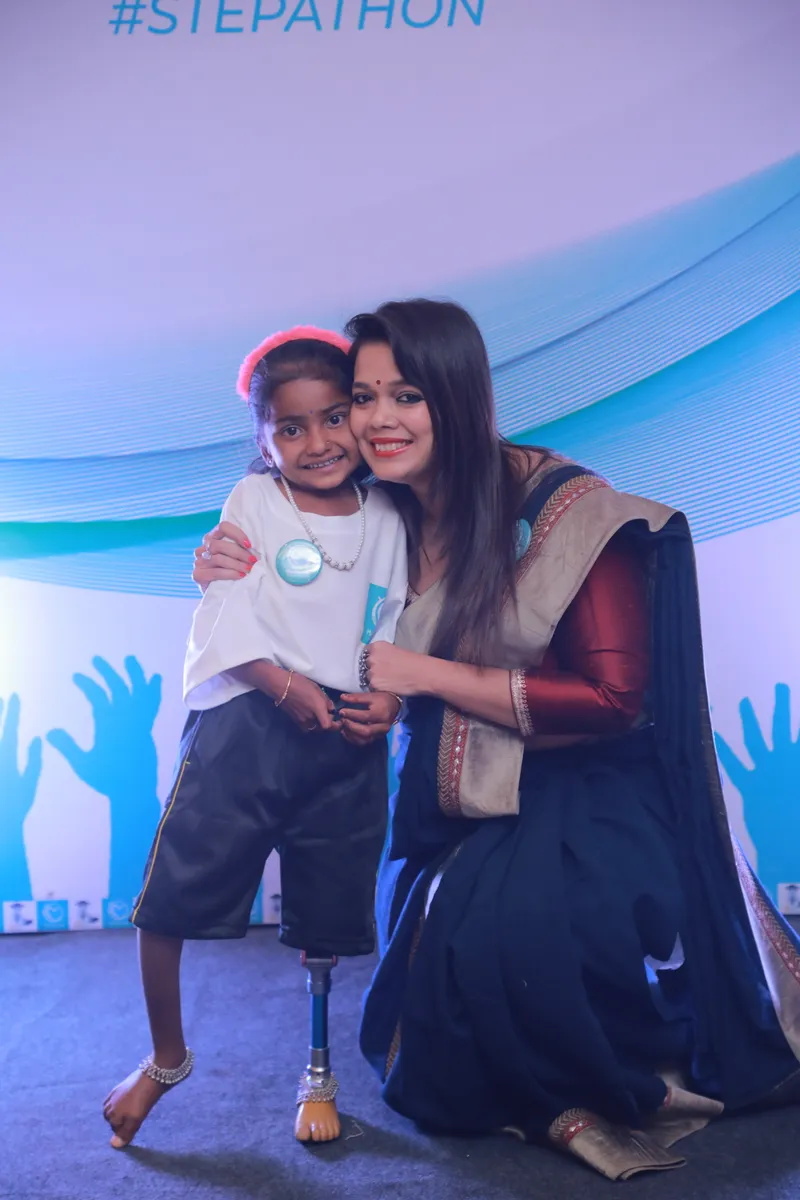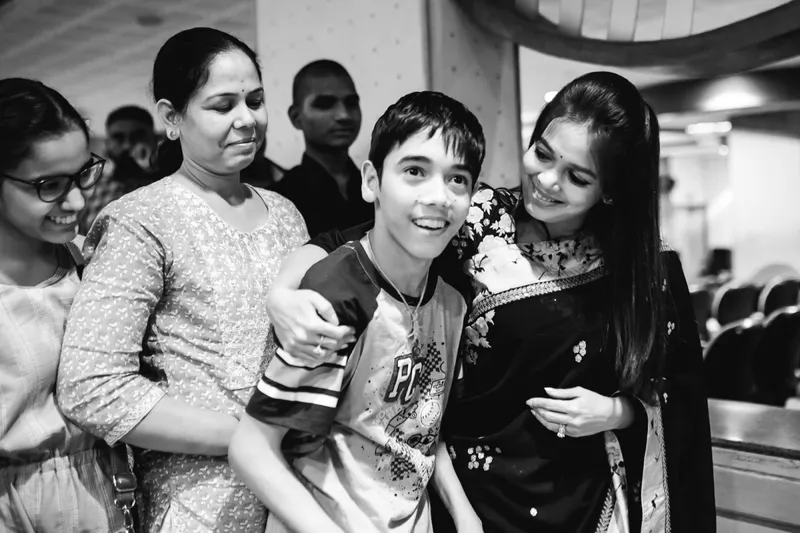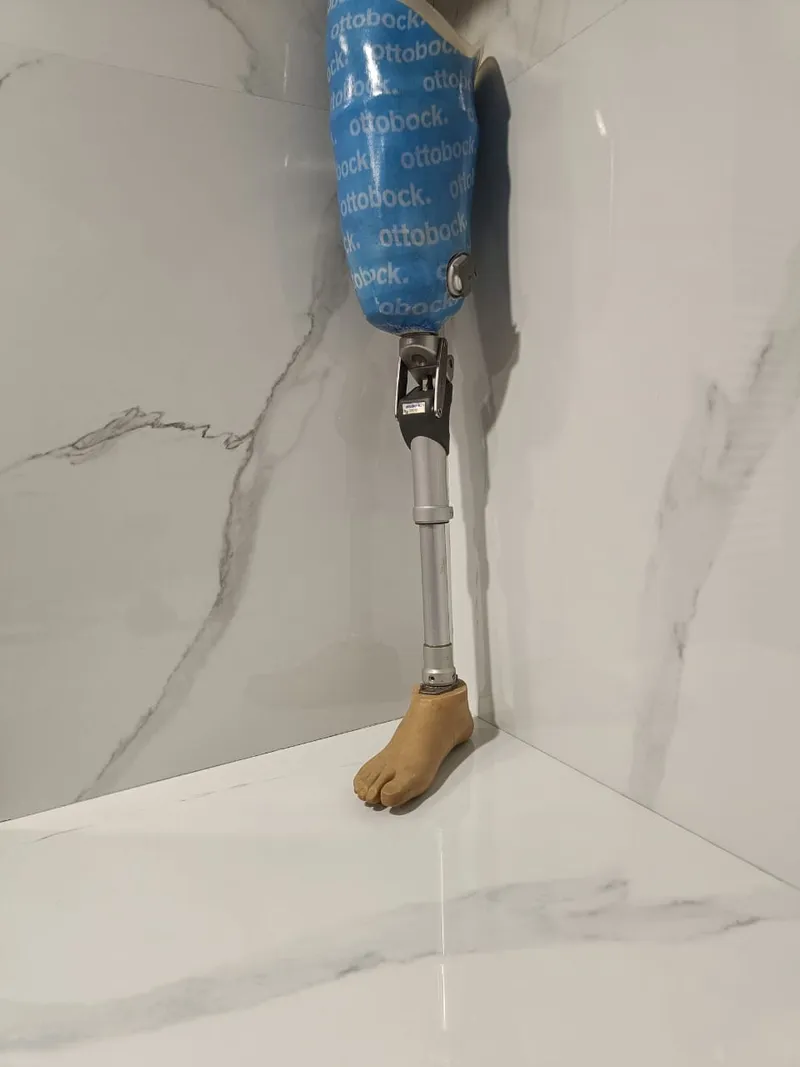This Ahmedabad woman provides free prosthetic legs to differently-abled people
The Madhuram Charitable Trust provides physiotherapy, speech therapy, corrective surgeries, and prosthetic legs to underprivileged children and adults free of cost.
Shraddha Soparkar, a 38-year-old woman, was sitting in a hospital hallway during lunchtime waiting for her daughter, who was undergoing therapy for cerebral palsy. The disease affects a person’s ability to move and maintain balance and posture.
As Soparkar’s gazed around, she noticed another woman’s child was also undergoing therapy in the same room as her daughter. She saw the lady was only consuming buttermilk for lunch, which made Soparkar grow curious.
Not being able to hold back, Soparkar asked the lady why she did not have lunch, to which she replied, “If I eat daily, how will I pay for my son’s therapy?” leaving Soparkar in dismay.
“I was frozen for a moment on hearing it. Instantly, I decided to support the lady by paying for her son’s therapy,” Soparkar tells SocialStory.
Starting with one child, Soparkar soon started offering financial support to many such children. When she was helping the tenth child, her family suggested she take this initiative to a large scale, and Madhuram Charitable Trust was born in 2019.
The Ahmedabad-based organisation helps specially-abled children by providing physiotherapy, occupational therapy, speech therapy, corrective surgeries for joints, botox surgeries, hearing aids, and crutches.
In 2021, the trust started a programme called Stepathon, where it provides free prosthetic legs to underprivileged people.
Laying the foundation

Shraddha Soparkar
Soparkar has a law degree but tells SocialStory that she never practised it professionally. She grew up in a business family and got married into one, and her life revolved around business until she became a mother in 2018.
She gave birth to a normal baby girl—Shruti. However, Shruti caught an infection and was diagnosed with cerebral palsy. Due to her medical condition, Shruti faced significant challenges in performing basic activities, including walking, sitting, and talking, and she had to undergo four brain surgeries.
“Having a child is a huge responsibility, and when it comes to a specially-abled kid, the parent’s role is even more demanding,” Soparkar says.
In fact, taking care of a specially-abled kid significantly affects a person’s emotional health. Further, if financial problems are tagged along, the situation worsens.
Belonging to an affluent family, she considers herself lucky that she had the resources to provide her child with the best treatment. “Despite having all the resources, the journey has not been easy. Regular doctor visits, hours of therapy, and seeing your child going through multitudes of treatments can be painful and draining,” she confesses.
In such medical conditions, different forms of therapy and corrective surgeries are essential to building the cognitive and motor skills of the child. However, these therapy sessions can be expensive and unaffordable for many people.

Therefore, Madhuram Charitable Trust has tied up with hospitals, including Sparsh Paediatric Rehabilitation Clinic and Hishu Child Development and Intervention Centre, to provide therapy and surgeries.
Besides cerebral palsy, the trust assists children with mental health-related disabilities, including autism, mental retardation, hearing disabilities caused by mental health issues, and more.
So far, it has sponsored the therapy cost of 800 children and the corrective surgery for the cost of 10 children for polio, vision correction, hearing disability, and more.
Giving a new life

Prosthetic Leg
In 2021, as therapy centres shut down during COVID-19, it gave Soparkar enough time to think and bring out new ways to extend help.
The trust started Stepathon, where it provided prosthetic legs to amputees from marginalised communities free of charge, followed by physiotherapy. These are high-quality prosthetics imported from Ottobock—a German company dealing in orthopaedic technology.
Explaining further, Soparkar says these legs are light and easy to carry. They come with a silicon liner, making them more comfortable to wear. The prosthetic legs have a hydraulic knee joint, which eases the movement, and its foot thrust makes it easy to walk.
“People can cycle, bathe, drive, and climb on these legs. My motto with this initiative has always been to give what you will use for yourself,” Soparkar adds.
Roshni, one of the beneficiaries, was born without a left foot. Her mother, Sajida, recalls Roshni being dependent on her for basic things like bathing and going to the toilet. “It was a very hard time for me until she turned five, and we were provided a prosthetic left by Madhuram Charitable Trust,” she says.

Roshni
Sajida continues, “Now my daughter can walk, dance, play Garba, climb stairs, attend school by herself, and most importantly, she can play with kids normally. She no longer experiences any difficulties in walking.”
These prosthetics are priced at Rs 30,000 for the foot, Rs 80,000 for the below-knee leg, and more than Rs 1 lakh for the full leg.
However, the trust gets a 5% discount from the German company on bulk buying. Since these legs are custom-made, they require proper fitment. And the company has waived the fitment cost and customs duties for the trust. It also helps in providing free physiotherapy to beneficiaries.
Initially, the trust advertised the initiative to gain traction. But it started receiving requests from many beneficiaries from word of mouth. After checking and verifying their identity proofs, the trust provides the person with the leg.
“Our initial focus is on the youth as they are the future of their families. After that, we provide for children, followed by older people. It is a hard choice, but we need to make it,” Soparkar adds.
So far, the trust has distributed nearly 220 prosthetic legs in India. It has multiple funders, including KHS FICCI, CAVITAG, Navin House, and Seth Mannulal Jagannath Das Trust. The trust also plans to launch its aqua therapy centre for mentally challenged children in Ahmedabad.
Recalling her experience, Soparkar says, “My daughter could not walk, so we were suggested to provide her aqua therapy, wherein certain exercises are performed in water for physical rehabilitation and other therapeutic benefits.”
“The therapy was helpful for my child, and I wish to expand this concept to other specially-abled children,” she adds.
Furthermore, Soparkar plans to hire 20 teachers to care for individual children in the therapy sessions. She aims to provide therapy to at least 100 children in a day.
“No disabled person is a burden on the family. If they are rendered the right skills and brought into the mainstream, they can do wonders, too,” Soparkar says.
Edited by Suman Singh







